SOLOMON NO KAGI
( Solomon's Key )
|
|
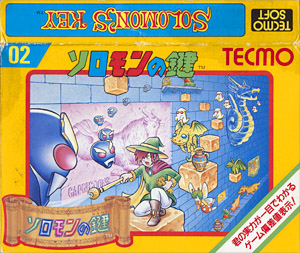
|

|
|
ソロモンの鍵
©Tecmo, Ltd. 1986
Release: 1986-07-30 (¥4900)
Cartridge TCF-SK
Action/Puzzle
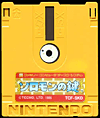

|
Released in Japan (Disk Writer) as
SOLOMON
NO KAGI
( TCF-SDK )
|
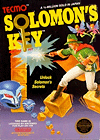

|
Released in America as
SOLOMON'S KEY
( NES-KE-USA )
|
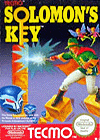
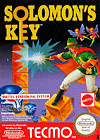
|

Released in Europe as
SOLOMON'S KEY
( NES-KE-XXX )
|
|
Solomon no Kagi (aka Solomon's Key) is an action/puzzle game by
Tecmo, and conversion of the arcade game of the same name originally released
in 1986. Eons ago, demons roamed at large in the world and caused chaos. To prevent
the world's utter destruction, the king Solomon used his benevolent magic to
create a book, only weapon capable of sealing away all the demons and their powers.
The book, known as the Solomon's Key, eventually restored peace and order to
the world. But, in the present day, an evil mind found the mystical spellbook and used
it to free many of the ruthless demons from their captivity. King Yutora
(aka Yutra) from the Lilac (aka Lyrac) fairy kingdom sends
Dana, his best wizard, on a dangerous mission to restore peace and order.
The young enchanter must travel through the Miya constellation and its twelve
areas based on the Zodiac signs. Each level is a chamber filled with blocks, items,
enemies and, most importantly, a door and a key. The latter are at the core of what
makes Solomon's Key tick - in order to complete a chamber, Dana must
first collect a key and then make it to the exit door before a timer runs out. However,
the task at hand is far from easy and each chamber is filled with lethal obstacles and
deadly enemies - but Dana has a few tricks up its sleeve. His magic wand allows
him to create or remove blocks below him, or facing him. This ability is at the core of
the gameplay and is the main component used to solve the game's fiendishly puzzles.
Dana also come equipped with a short supply of fireballs (listed on a
scroll in the upper-right corner of the screen) that he can use to overcome even the
toughest enemies. Blocks and defeated enemies also often reveal bonus items that come
in various shapes and forms, from colored jars (fireballs or super fireballs),
scrolls (extants the fireball scroll), hourglass (increases time) and
so forth. Additionally, bells are scattered throughout the game and release
fairies - they are an important aspect of the game and each chamber usually hides
a few (Dana is awarded an extra life for each ten fairies he collects).
Solomon's Key consists of fifty chambers and holds many secrets, such as
hidden rooms, special items and warps to only name a few.
|
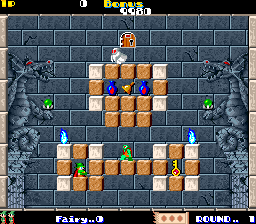 The arcade game Solomon's Key was originally released by Tecmo in 1986 (picture on the left).
The game was apparently a commercial success and was ported to a wide range of home
systems (especially in Europe it seems), such as the Famicom (1986),
Atari ST (1987), Commodore 64 (1987), Sinclair ZX81 (1987),
Amstrad CPC (1987), Master System (1988) and was later included in
the Tecmo Hit Parade (Playstation 2, 2004) and Tecmo Classic Arcade (XBox, 2005)
compilations.
Although Solomon's Club
followed for the Game Boy in 1991 (which is a sort of a remixed version
of the Famicom version), the true sequel to Solomon's Key only appeared in 1992.
Solomon no Kagi 2: Kūrumin Shima Kyūshutsu Sakusen (aka Fire'N Ice in
the US and Solomon's Key 2 in Europe) was exclusively available for the
Famicom/NES system and featured a completely new concept where Dana
can create blocks of ice (instead of blocks of stone) and use them to put out small
flames. Sadly, the Solomon's Key franchise has been in hiatus since then...
However, several other titles are worth mentioning though, such as
Zipang
(a port of Solomon Key for the PC Engine and released in 1990), or
Solomon (aka Monster Rancher Explorer in the US), a fun rebooted
version of the original arcade game and released for the Game Boy Color
in 2000. Another interesting game is called Tang Tang and was released in
Europe and the US for the Game Boy Advance in 2001 - it is an unusual and average mix
(read here rip-off) of Solomon's Key with Bomberman wannabes characters.
The arcade game Solomon's Key was originally released by Tecmo in 1986 (picture on the left).
The game was apparently a commercial success and was ported to a wide range of home
systems (especially in Europe it seems), such as the Famicom (1986),
Atari ST (1987), Commodore 64 (1987), Sinclair ZX81 (1987),
Amstrad CPC (1987), Master System (1988) and was later included in
the Tecmo Hit Parade (Playstation 2, 2004) and Tecmo Classic Arcade (XBox, 2005)
compilations.
Although Solomon's Club
followed for the Game Boy in 1991 (which is a sort of a remixed version
of the Famicom version), the true sequel to Solomon's Key only appeared in 1992.
Solomon no Kagi 2: Kūrumin Shima Kyūshutsu Sakusen (aka Fire'N Ice in
the US and Solomon's Key 2 in Europe) was exclusively available for the
Famicom/NES system and featured a completely new concept where Dana
can create blocks of ice (instead of blocks of stone) and use them to put out small
flames. Sadly, the Solomon's Key franchise has been in hiatus since then...
However, several other titles are worth mentioning though, such as
Zipang
(a port of Solomon Key for the PC Engine and released in 1990), or
Solomon (aka Monster Rancher Explorer in the US), a fun rebooted
version of the original arcade game and released for the Game Boy Color
in 2000. Another interesting game is called Tang Tang and was released in
Europe and the US for the Game Boy Advance in 2001 - it is an unusual and average mix
(read here rip-off) of Solomon's Key with Bomberman wannabes characters.
|
|
The original arcade game and the Famicom port are fairly similar. The
chambers are (for the most part) the same but the Famicom version arguably
features more of them (well, although the arcade game consists of fifty one chambers,
five of them are generic bonus levels so, technically, the Famicom version
feature more original levels). The console port also feels easier and the player is
allowed more time to complete each chamber. Some bonus items and secrets are different
(the arcade version has different keys that lead to hidden bonus stages for instance),
and the arcade version has slightly more enemies (such as colored slimes).
|
Teaser text copied from the American version:
You and Dana, the wizard of Lyrac,
must unlock Solomon's scroll of
secrets to restore peace in the
constellations.
With Dana's magic, fire, and
mystical powers, you will help
release the imprisoned Princess of
the Fairies and harness the evil
forces withing the constellations. But
first, you need the key!
Solomon's Key! - the arcade hit.
|
G
O
O
D
I
E
S
|
|
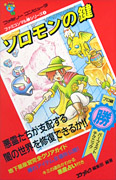
Japanese Guidebook
|
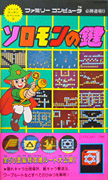
Japanese Guidebook
|
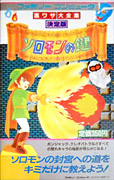
Japanese Guidebook
|
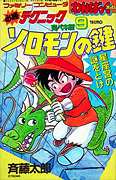
Japanese Comic
|
|
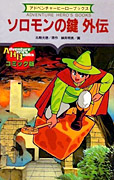
Japanese Adventure Book
|
|
|
O
M
A
K
E
|
|
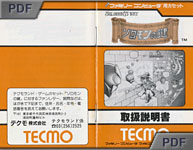
|
|
|
Click on picture to enlarge |
S
E
C
R
E
T
S
|
|
Continue:
When you die, on the GDV (Game Deviation Value score) screen, hold A, B and Up,
then press Start. However, although this cheat lets you continue on the
chamber you died on, it stops at level 41. The last ten chamber must be therefore
completed in one go with only three lives.
Special magic gems:
Two magic gems in the game change form when Dana uses his wand on them.
The blue gem  cycles from a fire potion, a red jewel and gold coins.
The orange gem
cycles from a fire potion, a red jewel and gold coins.
The orange gem  is a lot more interesting (and harder to find) and cycles from super fire potion,
a bell and a fireball scroll.
is a lot more interesting (and harder to find) and cycles from super fire potion,
a bell and a fireball scroll.
General rules about hidden items:
There are several kinds of items in the game. Some are in plain sight and visible from the
start of the level, some are hidden inside blocks and only appear when Dana removes
these blocks, whereas others are hidden behind empty spots and Dana must create a
block and remove it in order to reveal them. Finally, some items appear under certain
conditions (like hitting a block several times), and others only appear the first time
you enter a chamber!
Zodiac tiles:
Locations : chambers 4, 8, 12, 16, 20, 24, 28, 32, 36, 40, 44 & 47
 Twelve zodiac tiles are scattered throughout the game. They appear every fourth chamber and
are usually clearly visible (but some of them are hidden inside blocks or on in an empty spot
later in the game). Each Zodiac area features a fifth hidden bonus room, and these zodiac
titles allow you to access them. Each hidden chamber comes with many fairies and bonus items.
Twelve zodiac tiles are scattered throughout the game. They appear every fourth chamber and
are usually clearly visible (but some of them are hidden inside blocks or on in an empty spot
later in the game). Each Zodiac area features a fifth hidden bonus room, and these zodiac
titles allow you to access them. Each hidden chamber comes with many fairies and bonus items.
|
|
Solomon seals:
Locations : chambers 9, 13, 17, 19, 21, 29, 46 & 47
 Eight Solomon Seals
are scattered throughout the game and allow Dana to rescue
the fairy princess Rihita at the end of the game. The seals also unlock two special
rooms - as you collect Solomon Seals, two special chambers will appear during
the game (you must collect the Zodiac tiles to make them appear), and reward you with the
two missing pages of the Solomon spell book. This combination (fairy princess + missing pages)
gives you access to the best ending in the game. There is one tricky thing about the
Solomon Seals though - if you happen to miss one seal, then none of the following seals
will appear!
Eight Solomon Seals
are scattered throughout the game and allow Dana to rescue
the fairy princess Rihita at the end of the game. The seals also unlock two special
rooms - as you collect Solomon Seals, two special chambers will appear during
the game (you must collect the Zodiac tiles to make them appear), and reward you with the
two missing pages of the Solomon spell book. This combination (fairy princess + missing pages)
gives you access to the best ending in the game. There is one tricky thing about the
Solomon Seals though - if you happen to miss one seal, then none of the following seals
will appear!
Mighty Bomb Jack:
Locations : chambers 17 & 39
 Tecmo's trademark character Mighty Bomb Jack
is hidden in the game. To make
him appear, you must hit a specific unbreakable block with your head eleven times - this trick
reveals Bomb Jack and touching him turns all the enemies on the screen into fairies.
The first Bomb Jack is hidden in room 17 (the block is three spaces above Dana's
head when you start the chamber), and the second in room 39 (the block is one space left above
the exit door).
Tecmo's trademark character Mighty Bomb Jack
is hidden in the game. To make
him appear, you must hit a specific unbreakable block with your head eleven times - this trick
reveals Bomb Jack and touching him turns all the enemies on the screen into fairies.
The first Bomb Jack is hidden in room 17 (the block is three spaces above Dana's
head when you start the chamber), and the second in room 39 (the block is one space left above
the exit door).
Other secrets:
There are tons of other hidden items in the game - a lot of them award the player with bonus points,
whereas others, such as the golden wings, warp Dana to farther chambers in the game. But I
leave that to you to find out, I've spoiled enough already...
|
|
|
|
LK

|
|
Add your Pov here !
|
P
O
V
s
|
|
I have very fond memories of Solomon's Key - I played it to death
on my good old Atari ST as a kid (the music track is definitively
burned into my mind forever). Solomon's Key is a puzzle-driven game
and it does this exceedingly well. But don't be mislead by this
aspect - both strategy and action skills must be used to complete the
game and solve its many mysteries. The one thing that always really
struck me about Solomon's Key is the attention to detail, and
especially in the gameplay department. There are so many items, secrets
and even when you complete the game, you want to visit these chambers
again to find that little thing you missed the first time. That's it,
although the game is really hard (no continues nor save options), chambers
are 'easy' to beat once you know what to do (all chambers can be solved
without using a single fireball!). The more risk you take, the more secrets
you unveil, and this is what makes the game so brilliant. Granted
Solomon's Key is not for everyone and it is a game that requires
a lot of time and investment - but I think that it carefully (and perfectly)
balances action and puzzle elements to create an unique gameplay experience.
|
|
|
|